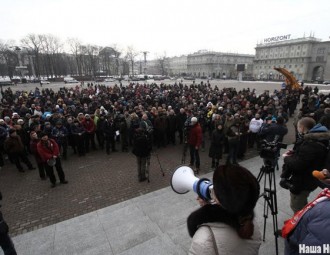About a thousand people took part in the demonstration of entrepreneurs in central Minsk
 nn.by
nn.by
The next meeting is scheduled for February 22 in Kastrychnitskaya Square in Minsk.
About a thousand entrepreneurs staged a protest in downtown Minsk on Monday to demand that Aliaksandr Lukashenka reverse the Decree No.222, which they say is impossible to comply with.
After gathering in Kastrychnitskaya Square, the protesters displayed signs that accused the government of leaving self-employed entrepreneurs without work.
There was a heavy presence of police officers at the scene but they did not interfere. Not a single government official turned out to speak to the crowd, naviny.by informs.
The demonstration was joined by opposition politicians Mikalai Statkevich, Uladzimir Niakliaeu and Anatoly Liabedzka, as well as by small vendor and opposition activist Ales Makaeu.
According to Dzmitry Kuchuk of the Belarusian Party of the Greens, Lukashenka's Decree No. 222 has paralyzed the business of traders who used to import eco-friendly goods from Russia. It is important that all businesspeople display solidarity with stallholders, he stressed.
Ales Talstyka, an activist of the Movement for Freedom and a former small vendor, said that he had taken offense at Lukashenka's remarks likening non-food stallholders to criminals.
The chairperson of a Slutsk-based market's stallholder council, who gave only her first name, Safiya, called on self-employed entrepreneurs to gather in the square every Monday until their demands were heard by authorities. It is important to make Belarus' leadership realize that the decree is «ruinous to the country's citizens,» she stressed. The woman said that Iryna Jaskevich, a prominent small business leader in Vitebsk who was not in attendance, had been warned by plainclothesmen the day before that she would be jailed if she took part.
In an emotional speech, Niakliaeu said that authorities were stifling stallholders because they were «free people.» According to the former presidential candidate, the government is wary of a middle class that could become the basis of democracy in Belarus. Referring to the European Union's planned decision to lift its sanctions on Belarusian government officials, Niakliaeu called for adopting a statement urging the EU to change its mind. «Today the Belarusian regime is removing the skin from the people and the EU wants to lift the sanctions on it. This is unfair,» he stressed.
Addressing the crowd, Makaeu read out a petition that was to be sent to the Presidential Administration after the demonstration. It included demands that the controversial decree be immediately abolished and that Lukashenka hold urgent talks with non-food stallholders.
«If the government doesn't accept our demands we will have to tell the Belarusian people that we are ruled not by a government but by a gang. And our call to the people will be as follows, 'Off with the gang, power to the people!» he said.
Liabedzka, who leads the United Civic Party, said that the problems of non-food stallholders concerned all other people as well, while Statkevich accused Lukashenka of clinging to power illegally. «The country has been seized by a gang, servants of one person who wants to remain in power for ever,» he said.
«Only by taking back power we will be able to live normally,» said Statkevich. «If power is in people's hands Belarus will become a successful country.»
The crowd agreed that the next demonstration should take place at the same venue next Monday.
Commenting on the fact that police officers did not break up the demonstration or make arrests, Makaeu suggested that Lukashenka would use it in his talks with Western politicians. «Today the regime is receiving loans from both the West and the East and he will be able to use today's event to claim that there's democracy in Belarus,» he said.
Let us recall that many stallholders at markets and shopping malls across Belarus have been keeping their stalls closed since January 1 because they are afraid that they will face severe penalties for failure to comply with Decree No. 222.
According to the Decree No. 222, entrepreneurs will need documents for goods imported from the territory of the Customs Union after January 1, 2016. However, Russian suppliers refuse to give such documents or offer fake certificates. It results in fines and confiscation. Entrepreneurs have asked the authorities to cancel the law many times but the government won’t react.
Lukashenka indicated that he would not agree to soften the new rules established by his decrees.
-
03.01
-
07.10
-
22.09
-
17.08
-
12.08
-
30.09



























